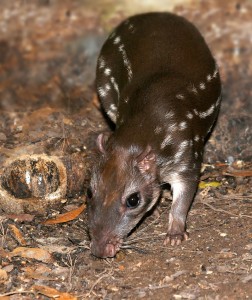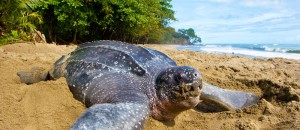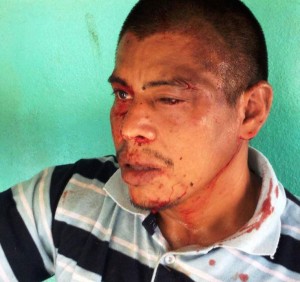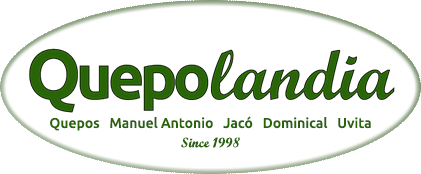POACHING: A New Mafia is Determined to Destroy Our Wildlife and Forests

By Jack Ewing
Years ago when I posted the first “NO HUNTING” signs on Hacienda Baru, the prohibition was aimed at neighbors who loved to hunt. Most of game in the parcels of forest left in the area had been killed, and the hacienda still had 180 hectares (445 acres,) of healthy rainforest that harbored lots of wildlife. This is where everybody came to hunt, and prohibiting hunting was definitely not the way to win a popularity contest. Of course, nobody paid the least bit of attention to my signs. We often found them shot full of holes or chopped to pieces with a machete. Eventually I decided to hire a guard, a local man named Alejandro, who knew the forest well. Though having a guard didn’t stop the hunting entirely, it helped a lot. Then one day a friend of Alejandro’s convinced him to look the other way for just one afternoon. “Your boss always goes to San Isidro on Thursdays,” he begged. “ I haven’t eaten paca meat for months. Just let me kill one paca, and I won’t bother you any more.” Alejandro relented and let his friend hunt, “just this one time.”
Pacas are large rodents weighing up to 10 kilos (22 pounds) and measuring 70 centimeters (28 inches) in length. Since their diet consists almost entirely of fruits and seeds, paca meat is delicious and considered a delicacy. Though hunters also hunted deer and peccary, the paca was their favorite prey, and hunting pressure had driven them to local extinction in some areas.
Of course, Alejandro’s friend wasn’t satisfied with just one paca, and before long he, and another friend were hunting every Thursday, when I was in San Isidro. By the time I found out what was going on the situation was out of control. I dismissed Alejandro and hired another guard named Ignacio. Ignacio was known for being mean and nasty and didn’t have many friends. He wouldn’t let anybody trespass or hunt, and I thought we had the problem solved. Then one day Ignacio´s son José commented to my son Chris that they had eaten toucan soup the night before, and that it was delicious. When Chris started questioning him further José got nervous and tried to say he was only joking. The incident got me on alert, and I started asking around. It turned out that Ignacio was stopping all hunting on Hacienda Baru, but his motive had nothing to do with any desire to do a good job. Rather he wanted a personal monopoly on all of the game in the rainforest.
Over the years I have had many forest guards, and most have done an excellent job of controling the poaching. Stopping 100% of the hunting was, and still is, next to impossible, but the guards did keep it down to a tolerable level. In the end it was a local policeman, Don Marcos, who came up with the solution to the poaching problem. “If you can stop the poachers from hunting with dogs you will eliminate most of the problem,” he explained. “When the hunting dogs detect fresh paca scent they start baying, and you can hear them for several kilometers. The hunters can’t keep up with the dogs and are always several hundred meters behind yelling at the dogs in an effort to keep them excited and on the trail. What you have to do is get in front of the dogs, catch them and bring them to me. I will deal with the hunters,” promised Don Marcos.
I was a little dubious about Don Marcos’ idea, but decided to give it a try. About a week later we captured a dog. There had been two of the long eared canines with the hunters, but the other one got away. We took the dog to Don Marcos, and he locked it in a jail cell he had behind the small building that served as the police station. He almost never used the cell, and it was a good place to keep the hunting dog. The lock was to keep the hunters from sneaking in and liberating their pet. I left enough dog food to keep the animal well fed during its imprisonment.
It took the hunters a couple of days to figure out where their dog was. Three brothers went to Don Marcos office and asked about a lost dog. “One of our dogs ran away from home. He must have gotten on the trail of a paca and gotten lost. We’ve been looking for him for two days. Anyway we heard that you’ve got a dog here and figured it might be ours.”
“Well now,” said Don Marcos. “It just so happens that I do have a dog here, but it can’t be yours. Your dog ran away from home by itself, and this dog was with hunters who were trespassing on Hacienda Baru and hunting paca illegally. Your dog must still be lost.”
“Couldn’t we just have a look at the dog to make sure it’s not ours.”
“Naw. It would just be a waste of time. I’ve got things to do, and since you guys weren’t hunting with your dog, this one couldn’t be yours.”
The conversation continued along this line for a while, but eventually the hunters admitted to having been hunting on Hacienda Baru.
“Here is what we’re going to do,” explained Don Marcos. I’m going to type up a confession, and you’re going to sign it. You are going to admit to trespassing and hunting paca out of season and without a license. You’re also going to promise, in writing, never to hunt on Hacienda Baru again. In return, we’re not going to press charges this time. But I’m going to file this confession, and if you break your promise, we’re going to press charges for this time and next time too. How does that sound?”
Realizing that it was the only way they were going to get their dog back the hunters readily signed the confession. Over the years we repeated this scenario many times. No one ever came up with a novel excuse for losing their dog, nobody readily admitted having been hunting, and no one ever broke their promise not to return to Hacienda Baru. Word got around quickly, and soon the hunting on the hacienda all but come to a halt.
Poaching Today

Most of the local people have given up hunting. The biggest source of employment in the area is tourism, and people understand how important the animals and birds are to the tourists. Taking the occasional paca for the kitchen table still happens, but rarely. Today we have a new breed of hunters, armed professionals who hunt for profit, and are willing to resort to violence if necessary. The murder of Jairo Mora on May 31, 2013 in revenge for his work trying to stop the poaching of turtle eggs near Limon shook the nation and even made waves internationally. Six suspects were arrested and charged with the murder. They were four men and two women from Limon who made their living poaching turtle eggs, dealing drugs, robbing people at gun point, and any other illegal activity where they could make a quick buck.
On August 29, 2013 two wildlife inspectors responded to a call about illegal hunting. They confronted the hunters and confiscated a dog. During the scuffle that followed one of the hunters stabbed a wildlife inspector in the leg causing him to be hospitalized. The hunter was charged with illegal hunting and assault with a deadly weapon.
Not only are turtle egg and paca poachers becoming violent, but there have been a number of incidents of violent behavior shown by timber poachers. The attorney general of Costa Rica recently stated that the business of poaching of the coveted Almendro tree, essential for the well being of the great green macaw, is being run by a well organized mafia.

In early September of 2013, a group of tribal elders was meeting at the Terraba Indian Reserve in southern Costa Rica when they heard the faint whine of a chain saw in the distance. The tribal environmental commission was called and set out to find the site where the poachers were cutting timber within the reserve. They found the location of the cutting, but the thieves had fled into the forest. The commission members tried to call the forestry department of the environmental ministry, but there was no cell phone signal. Young Jehry Rivera was sent to find a place where he could make the call. Several hundred meters from the site he encountered one of the poachers who attacked him and beat him so brutally with a stick that he required hospitalization.
Why are we seeing such a trend towards violence with crimes against the environment? I believe it is because of the profitability of poaching. A nest of turtle eggs will sell for $40 to $60, double what the poacher can make at a regular job, and, in the middle of the turtle season, a poacher can easily steal two nests a night. An average size paca can be sold to certain restaurants for about $70. The trees that are being poached are worth up to $3000 per tree. For that reason we are now seeing professional poachers replace the traditional local hunter of the past.
Costa Rica recently passed a law prohibiting hunting of any kind anywhere in Costa Rica and levying fines of up to $3800 for poaching turtle eggs or wildlife. The same fines apply to restaurants that sell paca meat or turtle eggs. Everyone expected the new law to be a great deterrent to poaching, but in practice it isn’t working that way. If the person doing the poaching can convince the judge that he is poor and needs the meat or eggs to feed his family, he will go free. If a restaurant owner is selling paca meat and gets caught, he will claim he was lying about the meat being paca, and that it is really just chicken. The appearance is similar, and DNA testing is not an option on the meager budget of the wildlife department. The restaurant owner will keep the paca carcass in some other location and bring only meat already cut into pieces to the restaurant.
With turtle eggs the ploy is a little different. There are two beaches in Costa Rica, Ostional and Nancite, where thousands of turtles come to lay their eggs. If left to nature the second group to lay will dig up most of the eggs laid by the first group and the third group will dig up those laid by the second group. The exposed eggs will lay on the beach and rot, and, in the end, very few nests actually hatch. For this reason the environmental ministry allows the local people to harvest the first two batches of eggs on these two beaches. Bar and restaurant owners can buy these eggs legally and are given a certificate. After selling all of the legal eggs they will continue to buy from local poachers at reduced prices and use the same certificate they got with the legal eggs as proof that the eggs are legal.
Poaching is a serious problem worldwide and could very well drive elephants, rhinos, tigers, and other species to extinction in the not too distant future. It is such a big business that it has even brought violence to normally peaceful Costa Rica. What is the solution? No one has figured it out yet, and I don’t see one on the horizon. All we can do is keep working on it and do the best we can.

